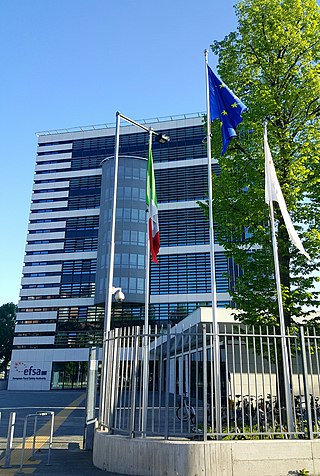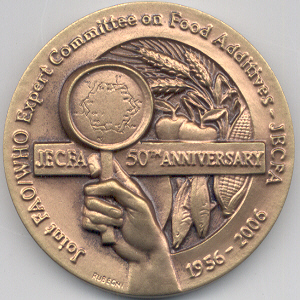A biocide is defined in the European legislation as a chemical substance or microorganism intended to destroy, deter, render harmless, or exert a controlling effect on any harmful organism. The US Environmental Protection Agency (EPA) uses a slightly different definition for biocides as "a diverse group of poisonous substances including preservatives, insecticides, disinfectants, and pesticides used for the control of organisms that are harmful to human or animal health or that cause damage to natural or manufactured products". When compared, the two definitions roughly imply the same, although the US EPA definition includes plant protection products and some veterinary medicines.

Phthalates ( ), or phthalate esters, are esters of phthalic acid. They are mainly used as plasticizers, i.e., substances added to plastics to increase their flexibility, transparency, durability, and longevity. They are used primarily to soften polyvinyl chloride (PVC). While phthalates are commonly used as plasticizers, not all plasticizers are phthalates. The two terms are specific, unique, and not used interchangeably.

The minister of health is the minister of the Crown in the Canadian Cabinet who is responsible for overseeing health-focused government agencies including Health Canada and the Public Health Agency of Canada, as well as enforcing the Canada Health Act, the law governing Canada's universal health care system.
The Committee on the Environment, Public Health and Food Safety (ENVI) is a committee of the European Parliament. It has 81 full members and is currently chaired by Antonio Decaro.
Pesticide residue refers to the pesticides that may remain on or in food, after they are applied to food crops. The maximum allowable levels of these residues in foods are stipulated by regulatory bodies in many countries. Regulations such as pre-harvest intervals also prevent harvest of crop or livestock products if recently treated in order to allow residue concentrations to decrease over time to safe levels before harvest.

The European Food Safety Authority (EFSA) is the agency of the European Union (EU) that provides independent scientific advice and communicates on existing and emerging risks associated with the food chain. EFSA was established in February 2002, is based in Parma, Italy, and for 2021 it has a budget of €118.6 million, and a total staff of 542.
A food safety agency or food administration or Food Safety Authority is a government agency responsible for ensuring the safety, quality, and proper labeling of food products within a country or region. These agencies play a crucial role in protecting public health by establishing and enforcing regulations and standards to ensure that food produced, imported, processed, distributed, and sold is safe for consumption.
The impact of nanotechnology extends from its medical, ethical, mental, legal and environmental applications, to fields such as engineering, biology, chemistry, computing, materials science, and communications.

The European Directorate for the Quality of Medicines & HealthCare (EDQM) is a Directorate and partial agreement of the Council of Europe that traces its origins and statutes to the Convention on the Elaboration of a European Pharmacopoeia.
The Scientific Committee on Emerging and Newly Identified Health Risks (SCENIHR) is one of the independent scientific committees managed by the Directorate-General for Health and Consumer Protection of the European Commission, which provide scientific advice to the Commission on issues related to consumer products.
The Scientific Committee on Consumer Safety (SCCS) is one of the independent scientific committees managed by the Directorate-General for Health and Consumer Protection of the European Commission, which provide scientific advice to the commission on issues related to non-food issues. It is the successor to both the Scientific Committee on Consumer Products (SCCP) and the Scientific Committee on Cosmetic Products and Non-Food Products (SCCNFP).
Because of the ongoing controversy on the implications of nanotechnology, there is significant debate concerning whether nanotechnology or nanotechnology-based products merit special government regulation. This mainly relates to when to assess new substances prior to their release into the market, community and environment.
The Directorate-General for Health and Food Safety, until 2014 known as the Directorate-General for Health and Consumers, is a directorate-general of the European Commission. The DG is responsible for the monitoring and implementation of European Union policies and laws on health and food safety. It is headed by European Commissioner for Health and Animal Welfare Olivér Várhelyi and Director-General Sandra Gallina.
The Interagency Coordinating Committee on the Validation of Alternative Methods (ICCVAM) coordinates U.S. federal government evaluation of new, revised, and alternative test methods. Alternative methods are methods for safety testing of chemicals and chemical products that use fewer or no animals or that minimize or prevent animal pain and distress.

The Joint FAO/WHO Expert Committee on Food Additives (JECFA) is an international scientific expert committee that is administered jointly by the Food and Agriculture Organization of the United Nations (FAO) and the World Health Organization (WHO). It has been meeting since 1956 to provide independent scientific advice pertaining to the safety evaluation of food additives. Its current scope of work now also includes the evaluation of contaminants, naturally occurring toxicants and residues of veterinary drugs in food.
Following the 2010 United Kingdom general election, the UK Government under the Cameron–Clegg coalition announced plans to curb public spending through the abolition of a large number of quasi-autonomous non-governmental organisations (quangos). This was styled in the national press as a "bonfire of the quangos", making reference to Girolamo Savonarola's religiously inspired Bonfire of the Vanities.

Galaxolide is a synthetic musk with a clean sweet musky floral woody odor used in fragrances. It is one of the musk components that perfume and cologne manufacturers use to add a musk odor to their products. Galaxolide was first synthesized in 1956, and used in the late 1960s in some fabric softeners and detergents. High concentrations were also incorporated in fine fragrances.

The Norwegian Scientific Committee for Food and Environment (VKM),, conducts open, independent, scientific risk assessments regarding safe food, food production and the environment upon request of the Norwegian Food Safety Authority and the Norwegian Environment Agency. VKM also carries out risk assessments on animal health, plant health, animal welfare and cosmetics for the Norwegian Food Safety Authority, and on microbiological products and alien organisms and trade in endangered species (CITES) upon request from the Norwegian Environment Agency. In addition, the Committee makes environmental risk assessments of genetically modified organisms for the Norwegian Environment Agency. The assessments are used as a basis for knowledge of the various ministries in Norway. The assessments also provide a basis for knowledge which the Norwegian Food Safety Authority uses to provide advice and determine regulations. The committee may raise matters on its own initiative. Risk assessments are made on an independent basis in accordance with internationally established methods. The scientific committee itself is to carry out risk assessments on their own initiative. The risk assessments are used by the Norwegian Food Safety Authority and the Norwegian Environment Agency when giving advice to Norwegian ministries, and when the Norwegian Food Safety Authority is developing new laws and regulations.

The German Federal Institute for Risk Assessment, abbreviated BfR, is a body under public law of the German federal government with full legal capacity. The institute comes under the portfolio of the Federal Ministry of Food and Agriculture and has the task of providing scientific advice to the federal government on issues relating to food safety, product safety, chemical safety, contaminants in the food chain, animal protection and consumer health protection. Further technical supervision is performed by the Federal Ministry for the Environment, Nature Conservation, Building and Nuclear Safety and the Federal Ministry of Transport.

A pesticide, also called Plant Protection Product (PPP), which is a term used in regulatory documents, consists of several different components. The active ingredient in a pesticide is called “active substance” and these active substances either consist of chemicals or micro-organisms. The aims of these active substances are to specifically take action against organisms that are harmful to plants. In other words, active substances are the active components against pests and plant diseases.








